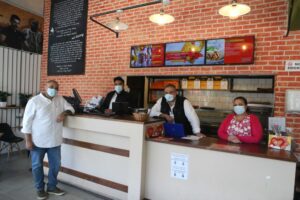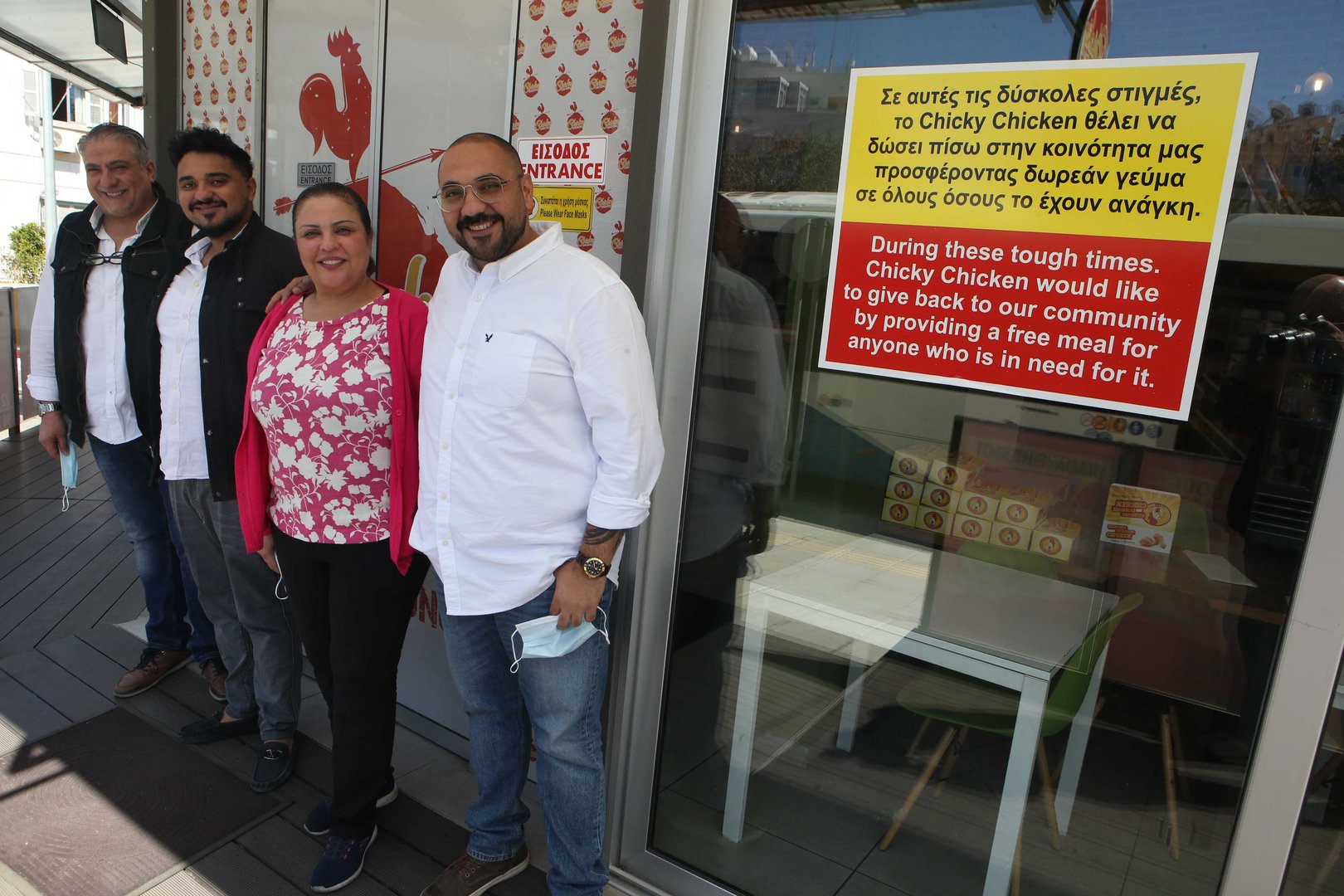Seeing the difficulties many were facing due to the pandemic, the family who run Chicky Chicken in Nicosia decided to do something to help
A family-owned, fast-food restaurant in Nicosia says its business has plummeted by 30 per cent since the pandemic. No surprise there, of course. Many businesses have lost the same or worse.
But how then do you explain the large sign on the front door in Greek and English?
“During these tough times Chicky Chicken would like to give back to our community by providing a free meal for anyone who is in need for it,” it reads.
Hungry for more information, I walked into the establishment on Kallipoleos street, where a young man welcomed me, and my first question to the 23-year-old co-owner, Yahya Al Samarrai, was why?
At a time when lockdown measures have crippled the economy and damaged many businesses, leading some to permanent closure, why would this family restaurant reduce their profits even more by giving away their food for free?

The family say that they don’t need to know that every person who takes them up on their offer is genuine, as long as they are helping some who need it
Established in October 2019 near the University of Cyprus, Chicky Chicken is run by four members of a family who moved to Cyprus from Jordan: Yahya and his older brother Nazar, together with their 58-year-old mother Kholoud Hijawi and their uncle, Kholoud’s brother, 46-year-old Mutaz Al Hijawi.
“At the very beginning of the pandemic, many students were left without money, they were counting the pennies in front of us to buy food,” 32-year-old Nazar said.
His younger brother, who is responsible for the celebrity wallpaper aesthetic in the shop, said he had read posts on social media from parents of young foreigners on the island suggesting there was no way to send them money and asking strangers to provide meals for their children.
Even if you came from a financially stable family, the coronavirus pandemic and the restrictive measures affected people’s ability to send and receive money from other countries, while many lost their jobs or were temporarily suspended from work without pay.
“This is how the idea came to us, we consulted with each other and everybody said yes,” Kholoud said.
So, ignoring the 30 per cent reduction in sales after the pandemic hit, the family put up the sign and decided to help anyone who walked by their door hungry and without much money.
But how do they know if people are being genuine?
“Only God knows your heart, we will never know,” Yahya told me with a smile.
Noticing my surprise, Mutaz, speaking up for the first time, shared a story in Arabic, about the time three teenage boys saw the sign and came asking for free food.
He offered each of them a meal and when they left, another customer asked him how he knew they weren’t lying. “I don’t know, and I don’t care to know,” he had replied.
Some saw the restaurant’s act of kindness and wanted to contribute. So, when a young woman made a small donation the family they decided to use it to increase the number of free meals they send every Friday to people in need.
Not everyone accepts free food, however. Many people come in the restaurant asking for money without paying attention to the sign. “When they don’t want the food, and insist on the money, I am a little bit suspicious,” Yahya said, though most of the times you can see it in people’s eyes that “they are genuinely grateful.”
For his hard-working mother, who is responsible for all the recipes in the restaurant – including a mouth-watering homemade chocolate cake – it is all a matter of perspective.
“Maybe ten people will come and nine of them will be liars, but you will help that one person.
“Yes, you don’t want to be taken advantage of, but I think at this time, during the pandemic you have to go for it, you have to try and help,” she said.
Shortly after she said that a scruffy, homeless man walked in. He had a long beard and a plaster on his right leg. His clothes looked old and despite the cold weather he only had a thin jacket on.
Speaking fluent Greek tinted with a Cypriot dialect, he asked for money or a place to sleep.
I watched as the family explained to him that they cannot possibly allow him to sleep at the restaurant, but they can prepare a “nice warm meal for him”. The man refused, insisting instead on his initial demands.
Yahya had already gotten up and asked the kitchen to prepare a crispy chicken and chips but the old man simply thanked them in Arabic and walked out.
I felt the energy shifting in the room, as the family, who a minute earlier felt happy they could provide a basic necessity, turned the conversation to who was responsible for the homeless.
“You don’t have to have gone through the same problems to sympathise with someone. We all know hardships,” the mother said. “And sometimes the pain is hurting you more if someone is suffering and you cannot help them.”
The family might not have ever experienced hunger, but they have been through their own enormous emotional and financial upheavals. The two sons and their mother lived in Jordan, but in 2004, the father, a politician in neighbouring Iraq, was assassinated.
“I was 15, my brother was seven,” said Nazar, “and when that happened my mother had to step up her game. She had to be the father, the mother, the supporter for the family. We studied in the best universities, in the best schools but that wasn’t easy. My mother, by herself, is a real superhero.”
Pushing through the grief, Kholoud showed she was a fighter and decided to open a small café with her cousin. The investment eventually turned into a chain of businesses including fast food and other restaurants as well as more cafes, which are all now being leased back in Jordan. “I made a lot of sacrifices and I think I succeeded in a way. I really have two good sons, I raised them to give back to the community,” she said.
Kholoud decided to move to Cyprus when she came to visit her younger son who was studying at a university here. Maintaining her passion for food, she decided to open Chicky Chicken and keep the prices low so “everyone is able to enjoy a decent meal”.
“When you help others, that is when you feel real happiness, and especially when you don’t care about people’s colour, image, or roots,” she said.
Persuaded in her idea that “everybody can help”, even if all they can offer is a piece of advice or simply a smile, Kholoud believes that if people stick together, any problems can seem less significant.
“Cyprus is a small community, if we have each other I think everyone can overcome this situation.”







Click here to change your cookie preferences